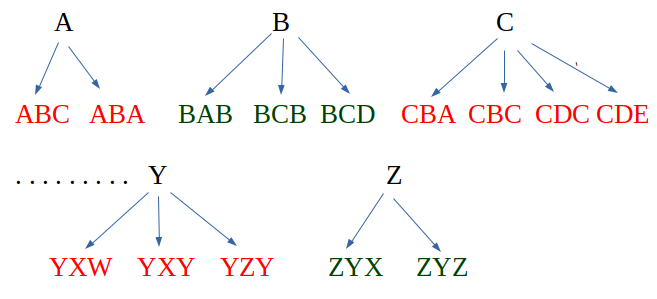Count of strings where adjacent characters are of difference one
Last Updated :
21 Dec, 2022
Given a number n, count the number of strings of length n such that every string has adjacent characters with a difference between ASCII values as 1.
Examples:
Input : N = 1
Output : Total strings are 26
Explanation : For N=1, strings
are a, b, c,, ...., x, y, z
Input : N = 2
Output : Total strings are 50
Explanation : For N = 2, strings
are ab, ba, bc, cb, .., yx, yz, zy
For strings starting with character ‘A’ and length ‘i’, we consider all strings of length ‘i-1’ and starting with character ‘B’
For strings starting with character ‘G’ and length ‘i’, we consider all strings of length ‘i-1’ and starting with character ‘H’ and all strings of length ‘i-1’ and starting with ‘F’.
We take the base case for n = 1, and set result for all 26 characters as 1. This simply means when 1 character string is consider all alphabets from a-z are taken only once.
For N = 2,

For N = 3,

Conclusion : For N = n

countAdjacent(n)
dp[i][j] finally stores count of strings
of length i and starting with
character j.
Initialize dp[n+1][27] as 0
Initialize dp[1][j] = 1 where j = 0 to 25
for i = 2 to n
for j = 0 to 25
if (j = 0)
dp[i][j] = dp[i-1][j+1];
else
dp[i][j] = dp[i-1][j-1] + dp[i-1][j+1];
Sum of n-th row from 0 to 25 is the result.
Implementation:
C++
Java
Python 3
C#
Javascript
Output
Total strings are : 98
Time Complexity: O(26*n)
Auxiliary Space: O(26*n)
Like Article
Suggest improvement
Share your thoughts in the comments
Please Login to comment...